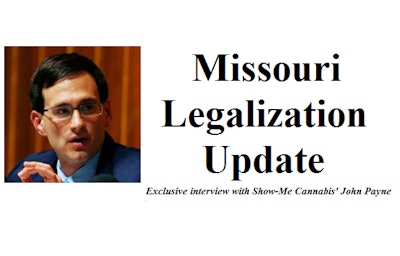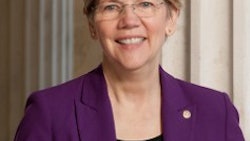
An exclusive interview with John Payne, executive director of Missouri's Show-Me Cannabis policy-reform organization.
by Noelle Skodzinski
In November 2014, Missouri cannabis-policy-reform organization Show-Me Cannabis (named after Missouri's nickname as The Show-Me State) filed a petition with the Missouri Secretary of State to amend the state constitution to legalize, tax and regulate cannabis. The petition was required to undergo a review and public comment period, according to the Show-Me Cannabis website, before signatures could begin to be collected.
The initiative is the second the group has proposed. The first initiative was proposed in 2012, and while it was ultimately unsuccessful, it served as the catalyst for the growth and solidification of Show-Me Cannabis, says the group's executive director, John Payne.
The new initiative would legalize the production, sale, distribution, and consumption of marijuana and hemp products by adults 21 years and older, and it would allow marijuana use for medical purposes. It also would tax and regulate marijuana sales, and establish licensing procedures to approve legal marijuana businesses, as well as remove criminal penalties for marijuana offenses and expunge records for those Missourians with previous marijuana offenses.
"We don’t want the government to interfere with the doctor-patient relationship here. Doctors are allowed to prescribe far more dangerous substances than cannabis." —John Payne
A question about the amendment's likelihood of passing, however, persisted. In February 2014, Show-Me Cannabis commissioned Greenberg Quinlan Rosner Research to conduct a statewide poll to assess public support for cannabis reform and the potential for the passage of a second ballot initiative for a constitutional amendment that would legalize marijuana. The poll asked, "If the election were held today, would you vote YES in favor of this amendment or would you vote NO in opposition to this amendment?" More than half (51 percent) of respondents said they would vote against (either "strongly" or "not strongly") the amendment; 45 percent said they would support (either strongly or not strongly) the amendment. Five percent either didn't know or didn't provide a response.
The group then conducted a more recent poll (in July) says Payne, which found support for legalization to be 47 percent; this showed an increase over the previous year, but it was still below the level needed to pass an initiative.
With Missourians teetering between support and opposition, the proposed constitutional amendment's fate was not sealed, and in fact, Show-Me Cannabis has now resolved itself to taking a step back on the recreational-legalization push and focusing on where the support is: medical marijuana.
I caught up with Payne to find out more about where the current initiative stands, and what the next steps are in the battle to legalize recreational or medical cannabis in Missouri.
Noelle Skodzinski: The initiative was filed last fall and, last we heard, it would have to be reviewed before you could start collecting signatures. Where does it stand now?
John Payne: So, that particular petition was reviewed, and we were cleared to begin collect the signatures on it. But before we did that, we needed to make sure that it was viable—that it would pass at the ballot box—so we did polling on it, and that indicated that we needed to do some pretty substantial revisions, basically making it a medical marijuana initiative.
And you know, as much as we would like to be able to pass a legalization initiative, the support for that just is not quite there yet. It’s about even, which I think surprises a lot of people, but it's still below a majority. What we found was, I think, 47 percent in favor of legalization and 49 percent against it, which is still an improvement. It’s been growing steadily over the last few years, but just not quite fast enough that we feel like we can be successful on that in 2016.
However, we are still going to be moving forward with a ballot initiative, but it’s going to be a medical cannabis initiative. We have the poll research [that shows] about 64-percent support, so that’s greatly encouraging.
NS: Is that for a constitutional amendment also?
JP: Yes. We haven’t yet filed it yet, but we’re working on one right now, and that’s guided by the poll research that we’ve done.
NS: Missouri does not currently have any real medical marijuana program, correct?
JP: We have a very limited program that ... one might even dispute whether it’s technically a medical marijuana program, but it’s one of the CBD-only programs.
And thus far, I don’t think anyone has been able to access any medicine through that system yet. There are two companies that are allowed to start producing the high-CBD, low-THC cannabis. But I don’t think they actually have a crop in the ground or they haven’t harvested yet, so people are just still waiting on that, despite the fact that the law was passed a little over a year ago.
NS: With the medical initiative that you're now working on, what are some of the regulations and stipulations that you’re trying to include?
JP: ... This is still in the works, so it’s hard to know exactly what it’s going to look like. But I think the main thing is that we don’t want the government to interfere with the doctor-patient relationship here. Doctors are allowed to prescribe far more dangerous substances than cannabis. So we think that they should be able to recommend cannabis for any debilitating disease that they think their patient could benefit from using cannabis.
But we also do want it to be a regulated system to make sure it’s not just going to ... people that don’t have any sort of medical problem.
So, you know, one of the things that the marijuana program would do, for instance, is that in order to keep a medical recommendation, you [would] have to see a doctor more than once. In a lot of states, you just see a doctor once, and that’s it—you have that card forever. But may be that would be updated every year or so at least.
Some other regulations we’ve talked about are that dispensaries would have to be a certain distance away from schools. That’s a fairly common one in many states, and probably one that will be included here as well.
NS: Is anything you’re planning on including as far as the number of growers that would be allowed, and any requirements along those lines?
JP: Probably. There will probably some ability for the state to limit the number of growers. But we definitely prefer a market-oriented approach where people are able to meet the demands of consumers, patients, as much as possible. But I do think that politically there is going to be some demand for some mechanism for how that’s limited.
But—and this is something that’s that I think the people of Missouri do want as well—we don’t want the government putting a very hard limit on the number of growers or dispensaries, because then you don’t really solve the problem that you are sent out to solve. So it’s a kind of a balancing act, but I think that what we’ll probably do is empower the legislature or that department to set a limit, but just make sure that limit is not onerous in any way.
NS: And are you thinking along the lines of any regulations or limitations on the methods of consumption of cannabis?
JP: I think there will be some regulation—for instance labeling, that sort of thing. I know there is a lot of concern about edibles and how those are labeled. And so I think there is probably going to be a fair amount of regulation on that, but I don’t think there is anything where we’re just going to say, "This whole method of consumption is not going to be allowed."
NS: So what’s the next step—to finalize the language?
JP: Yeah, I think it’s going to be happening fairly quickly over the next few weeks. We are wanting to file as soon as possible, but we should be fine provided we file this month. Right now, it's mostly just about getting all our stakeholders to agree on a final draft. The [next step will be] to get approved to start gathering signatures this fall. And then we also will start trying to raise ... about $1 million to gather the signatures that we will need in order to get it on the ballot.
And we'd need signatures in by May 8, 2016, which still gives us quite a lot of time. Usually the signatures drives only take about eight to 12 weeks.
But you do have to have the resources there to make that happen. So essentially right now, it’s all about finishing language, getting our campaign team together and getting the money raised.
NS: What can people in Missouri or those in the cannabis industry do to support your effort?
JP: Well, obviously they can go to our website and sign up for email updates. They can text SMC [for Show-Me Cannabis] to 420420 to get mobile updates. And, of course, they can always make a contribution to help our efforts along.
And then people in Missouri will be able to volunteer to help gather signatures in the very near future. They can volunteer right now, but we're not to the actual gathering-signatures point just yet.
NS: Am I correct that you don’t need to live in a state to help gather signatures?
JP: No, you don’t need to live in the state, but obviously if you live far way, it’s going to be difficult to do it. But, right, there is no residency requirement to gather signatures; you just have to be 18 years old.



























